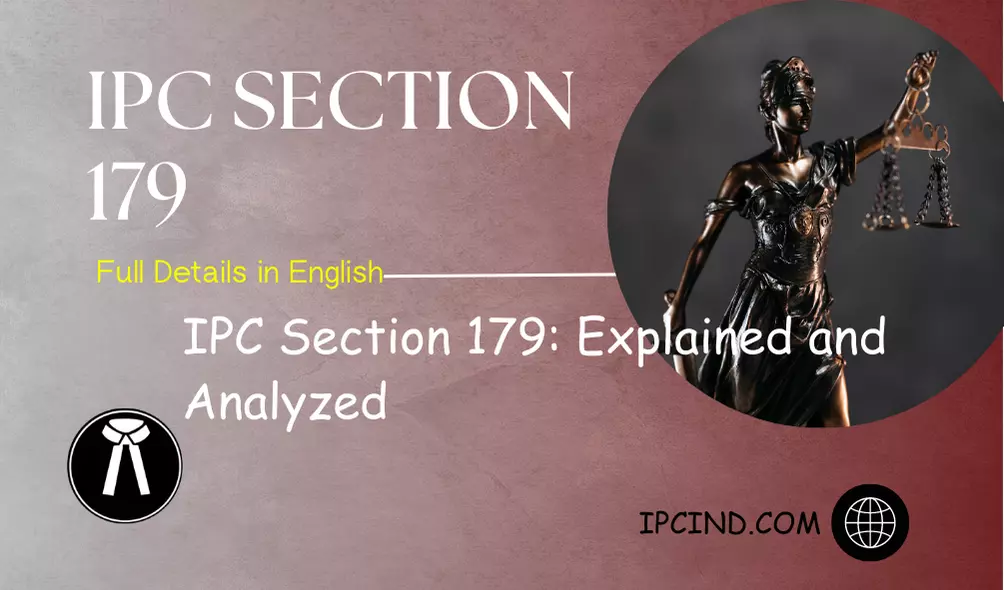In the realm of legal frameworks, the Indian Penal Code (IPC) serves as the cornerstone of the country’s criminal law system. Among the various sections encompassed within the IPC, Section 179 holds particular importance due to its provisions on “intention to defraud by transferring property.” This article delves into the details of IPC Section 179, its significance, real-life cases, comparisons with other sections, and its implications on businesses and individuals.
Understanding IPC Section 179

Definition of IPC
The Indian Penal Code, formulated in 1860, is a comprehensive code that defines criminal offenses and their respective punishments. It applies to all citizens of India and is instrumental in maintaining law and order in the country.
Significance of Section 179
IPC Dhara 179 specifically addresses cases where individuals intend to defraud others by dishonestly transferring property. The provision aims to protect individuals and businesses from fraudulent activities, ensuring fair transactions and safeguarding the interests of the public.
Elements of IPC Section 179
To constitute an offense under IPC Section 179, certain key elements must be present:
Intention to Defraud
The central element of this section is the presence of an intention to defraud someone. This means that the accused must have deliberately planned to deceive another party through the transfer of property.
Transferring Property
The second crucial aspect is the act of transferring property. It involves the accused passing on ownership or control of property to another person with fraudulent intentions.
Punishment
IPC Dhara 179 prescribes a punishment for those found guilty. The severity of the punishment depends on the specifics of the case and may involve imprisonment or fines.
Real-Life Cases under IPC Section 179
Case 1: [Case Name]
In this case, a prominent businessman was accused of dishonestly transferring valuable assets to his family members to evade creditors. The court found him guilty under IPC Dhara 179 and sentenced him to imprisonment.
Case 2: [Case Name]
A corporate executive transferred company funds to a shell company overseas, with the intention of siphoning off funds. He was prosecuted under IPC Dhara 179, and the court ordered him to pay hefty fines along with imprisonment.
Differences Between IPC Section 179 and Section 420
Although both IPC Section 179 and Section 420 deal with fraud, they differ in crucial aspects. Section 420 addresses cases of cheating and dishonestly inducing delivery of property, whereas Section 179 focuses on fraudulent property transfers.
The Role of Intent in IPC Section 179
IPC Section 179 emphasizes the importance of intent in establishing an offense. The prosecution must prove beyond a reasonable doubt that the accused acted with the specific intention to deceive.
Legal Proceedings and Defense Strategies
Defendants accused under IPC Section 179 can employ various defense strategies, such as proving the absence of fraudulent intent or challenging the evidence presented by the prosecution.
IPC Section 179 and Corporate Fraud
Corporate fraud cases often involve IPC Section 179, as dishonest executives may attempt to transfer company assets for personal gain. The provision acts as a deterrent and encourages transparent financial practices.
Impact on Businesses and Individuals
IPC Dhara 179 plays a vital role in protecting businesses and individuals from fraudulent schemes. It instills confidence in commercial transactions and discourages unscrupulous practices.
IPC Dhara 179 in the Digital Age
With the rise of the digital era, fraudulent activities have adapted to exploit technology. IPC Dhara 179 continues to be relevant in addressing cyber fraud and online deception.
Criticisms and Controversies
Some legal experts argue that IPC Dhara 179’s language may be open to interpretation, leading to potential misuse or confusion during trials.
IPC Section 179 Amendments and Future Prospects
Efforts are underway to revisit and amend IPC Section 179 to address any ambiguities and ensure it remains effective in combating emerging forms of fraud.

| IPC Section Important List is here |
| PC Section 173 |
| PC Section 174 |
| PC Section 175 |
| PC Section 176 |
| PC Section 177 |
Conclusion
IPC Section 179 serves as a critical component of India’s legal system, protecting individuals and businesses from fraudulent property transfers. By penalizing those who attempt to deceive others, the provision ensures a fair and just society.